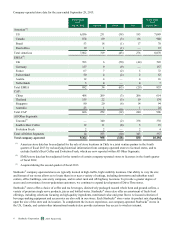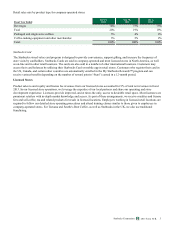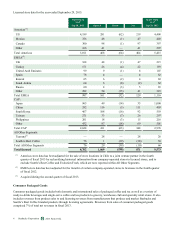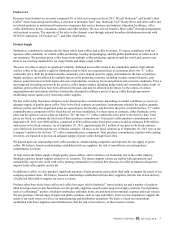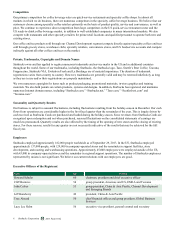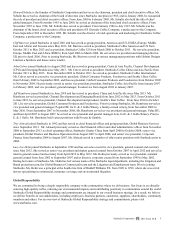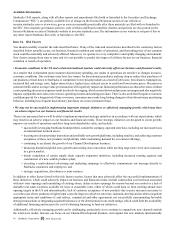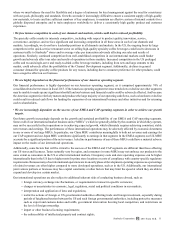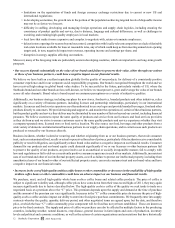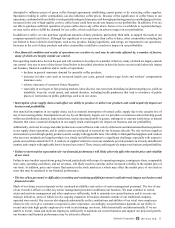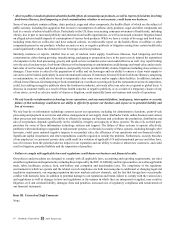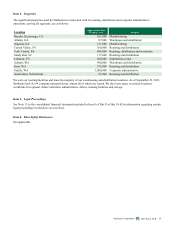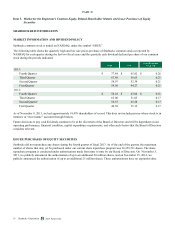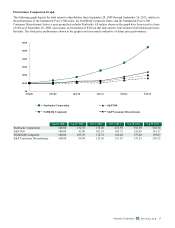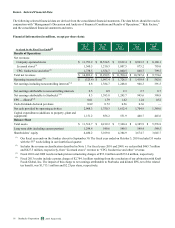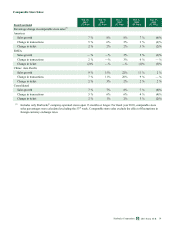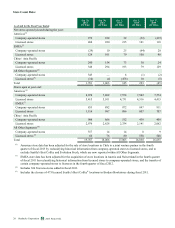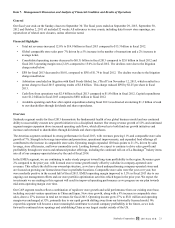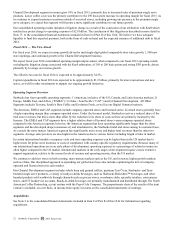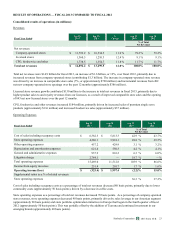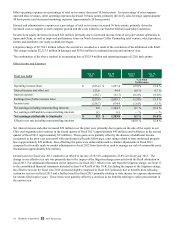Starbucks 2013 Annual Report Download - page 22
Download and view the complete annual report
Please find page 22 of the 2013 Starbucks annual report below. You can navigate through the pages in the report by either clicking on the pages listed below, or by using the keyword search tool below to find specific information within the annual report.
14
• Adverse public or medical opinions about the health effects of consuming our products, as well as reports of incidents involving
food-borne illnesses, food tampering or food contamination, whether or not accurate, could harm our business.
Some of our products contain caffeine, dairy products, sugar and other compounds, the health effects of which are the subject of
public scrutiny, including the suggestion that excessive consumption of caffeine, dairy products, sugar and other compounds can
lead to a variety of adverse health effects. Particularly in the US, there is increasing consumer awareness of health risks, including
obesity, due in part to increased publicity and attention from health organizations, as well as increased consumer litigation based
on alleged adverse health impacts of consumption of various food products. While we have a variety of beverage and food items,
including items that are coffee-free and have reduced calories, an unfavorable report on the health effects of caffeine or other
compounds present in our products, whether accurate or not, or negative publicity or litigation arising from certain health risks
could significantly reduce the demand for our beverages and food products.
Similarly, instances or reports, whether true or not, of unclean water supply, food-borne illnesses, food tampering and food
contamination, either during growing, manufacturing, packaging or preparation, have in the past severely injured the reputations
of companies in the food processing, grocery and quick-service restaurant sectors and could affect us as well. Any report linking
us to the use of unclean water, food-borne illnesses or food tampering or contamination could damage our brand value and severely
hurt sales of our beverages and food products, and possibly lead to product liability claims, litigation (including class actions) or
damages. Clean water is critical to the preparation of coffee and tea beverages and our ability to ensure a clean water supply to
our stores can be limited, particularly in some international locations. If customers become ill from food-borne illnesses, tampering
or contamination, we could also be forced to temporarily close some stores and/or supply chain facilities. In addition, instances
of food-borne illnesses, food tampering or food contamination, even those occurring solely at the restaurants or stores of competitors,
could, by resulting in negative publicity about the foodservice industry, adversely affect our sales on a regional or global basis. A
decrease in customer traffic as a result of these health concerns or negative publicity, or as a result of a temporary closure of any
of our stores, as well as adverse results of claims or litigation, could materially harm our business and results of operations.
• We rely heavily on information technology in our operations, and any material failure, inadequacy, interruption or security
failure of that technology could harm our ability to effectively operate our business and expose us to potential liability and
loss of revenues.
We rely heavily on information technology systems across our operations, including for administrative functions, point-of-sale
processing and payment in our stores and online, management of our supply chain, Starbucks Cards, online business and various
other processes and transactions. Our ability to effectively manage our business and coordinate the production, distribution and
sale of our products depends significantly on the reliability, integrity and capacity of these systems. We also rely on third party
providers for some of these information technology systems and support. The failure of these systems to operate effectively,
problems with transitioning to upgraded or replacement systems, or a breach in security of these systems, including through cyber
terrorism, could cause material negative impacts to our product sales, the efficiency of our operations and our financial results.
Significant capital investments and other expenditures could be required to remedy the problem. Furthermore, security breaches
of our employees' or customers' private data could result in a violation of applicable US and international privacy and other laws,
loss of revenues from the potential adverse impact to our reputation and our ability to retain or attract new customers, and could
result in litigation, potential liability and the imposition of penalties.
• Failure to comply with applicable laws and regulations could harm our business and financial results.
Our policies and procedures are designed to comply with all applicable laws, accounting and reporting requirements, tax rules
and other regulations and requirements, including those imposed by the SEC, NASDAQ, and foreign countries, as well as applicable
trade, labor, healthcare, privacy, food, anti-bribery and corruption and merchandise laws. The complexity of the regulatory
environment in which we operate and the related cost of compliance are both increasing due to additional or changing legal and
regulatory requirements, our ongoing expansion into new markets and new channels, and the fact that foreign laws occasionally
conflict with domestic laws. In addition to potential damage to our reputation and brand, failure to comply with the various laws
and regulations as well as changes in laws and regulations or the manner in which they are interpreted or applied, may result in
litigation, civil and criminal liability, damages, fines and penalties, increased cost of regulatory compliance and restatements of
our financial statements.
Item 1B. Unresolved Staff Comments
None.
2013 10-K
Starbucks Corporation Form


